Recent Posts
Restoring Damaged Documents
4/24/2024 (Permalink)
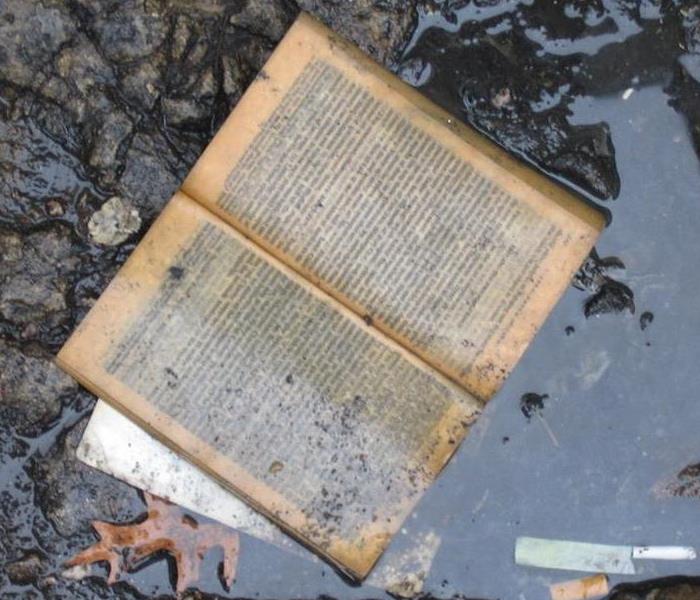 SERVPRO of Denton offers document restoration for all types of documents such as books, certificates, photographs, contracts, and much more.
SERVPRO of Denton offers document restoration for all types of documents such as books, certificates, photographs, contracts, and much more.
When your home or business experiences damage due to water, fire, or perhaps mold, valued documents may seem lost. Luckily, at SERVPRO® of Denton we offer document restoration services that help salvage your valued items.
What Exactly IS Document Restoration?
Document restoration involves methods such as vacuum freeze drying, gamma irradiation, certified destruction/incineration, cleaning, and deodorization that aim to restore damaged documents such as certificates, photographs or any other valuable file.
How Its Done:
- Vacuum Freeze Drying: This process involves freezing and drying an item containing moisture with various vacuums and pressures to achieve sublimation.
- Gamma Irradiation: Used for cleaning/disinfecting, and decontaminating documents by emitting high-energy photons from the isotope force Cobalt 60 to produce ionization, killing organisms that have affected the product.
- Certified Destruction/Incineration: When you or your facility have documents that are no longer needed our certified technicians can dispose of them properly.
- Cleaning: Each document is hand cleaned front and back, removing dirt, soot, or any other contaminants.
- Deodorization: Achieved by removing the odor causing agent then cleaning the document with various methods such as scrubbing, power-washing, sanitizing, ultrasonic immersion, or whatever else necessary. After the document has been cleaned off, we apply a deodorizer to the affected surfaces.
Our Process:
- Inventory: All documents will be inventoried at the location of the loss prior to packaging.
- Packaging: Documents will then be packaged/boxed accordingly
- Cold Storage: Documents will be frozen to prevent further damage.
- Shipping: Documents will be shipped to the SERVPRO corporate office for vacuum freeze drying.
- Receipt: Upon receipt of documents they will be placed either in cold storage until ready to be processed through the Vacuum Freeze Drying Chamber or processed immediately.
Why Choose SERVPRO?
As a leader in the restoration industry, SERVPRO of Denton knows that timely mitigation is the key to reducing severity and recovering damaged items. Without proper handling, valuable files and irreplaceable documents could be lost forever. Our technicians are trained to use the most advanced technology for document drying and recovery along with proper HIPPA Master Certification to protect your information and keep it confidential.
If you experience damage to valuable documents, you can trust SERVPRO of Denton to help make it “Like it never even happened.”
How to Prevent Lingering Issues Following a Fire
4/16/2024 (Permalink)
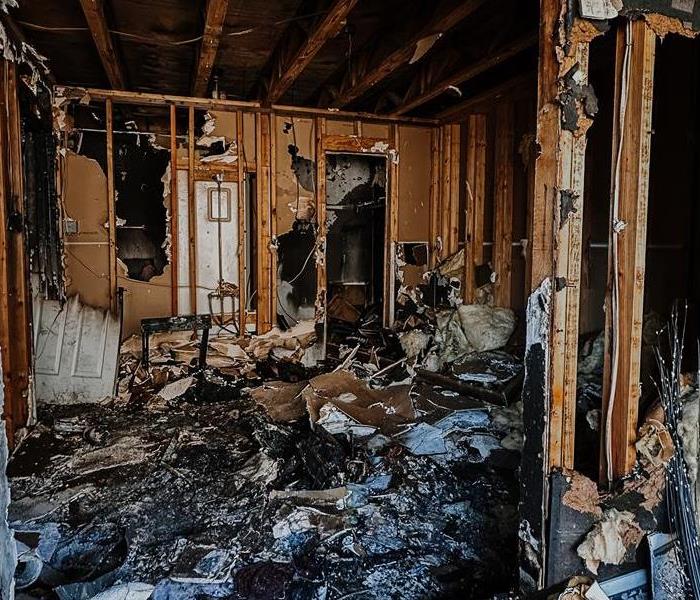 A fire caused tremendous damage to this house, leaving smoke and soot damage to the structure both inside and out.
A fire caused tremendous damage to this house, leaving smoke and soot damage to the structure both inside and out.
Not only does a fire cause visible damage to your property, it can also cause lingering problems that are hard for an untrained eye to detect such as smoke and soot damage. Smoke damage, if not taken care of immediately, can cause discoloration of surfaces, leave behind residues, and cause corrosion over time. Fires can also coat your properties in soot, which not only prolongs the cleaning process but can seep into fabrics, upholstery, and appliances as well as cause irreversible damage to flooring and walls. Lingering effects of fire damage are not limited to property damage, smoke and soot can also pose health risks affecting the respiratory system that can lead to coughing, shortness of breath, and respiratory distress.
In order to prevent further damage to your property and protect your health after you experience a fire, it is important to get a highly-trained and trusted restoration team, such as SERVPRO® of Denton, to your home or business immediately. At SERVPRO of Denton, our fire restoration process provides full restoration services after a fire to your residential or commercial property to ensure it goes back to its pre-damage conditions so that you don’t experience any lingering issues such as smoke and/or soot damage. The steps to this process include:
- Step one: Contacting us. Our team is available 24/7 to answer your call to begin the restoration process. Our specialist will ask you a series of questions about the fire event that will help us arrive quickly with the right equipment and resources needed.
- Step two: Inspection and Fire Damage Assessment. This step is crucial to developing a plan of action. Our team will inspect and test adjoining rooms of your property to determine the extent of the fire, smoke and soot damage.
- Step three: Immediate Board-up and Roof-tarp Service. SERVPRO can board up missing windows and walls and place tarp on damaged roofs to avoid further damage and maintain security.
- Step four: Water Removal and Drying. If water damage is present, we remove the water immediately, we will then use dehumidifiers and air movers to remove any remaining water and complete the drying process.
- Step five: Removal of Smoke and Soot From All Surfaces. SERVPRO uses special equipment and techniques to remove smoke and soot from walls, ceilings, and any other surfaces.
- Step six: Cleaning and Sanitizing. We will clean all of the restorable items and structures damaged by the fire by using various cleaning techniques. We are also trained to remove odors.
- Step seven: Restoration. In this final step, we will get your home to its pre-damage condition. This may involve minor repairs such as replacing drywall and installing new carpet; or major repairs such as the reconstruction of various areas in your home or business.
If your home or business experiences a fire, don’t hesitate to call SERVPRO of Denton to begin the restoration process and get your property back to normal “Like it never even happened.”
How to Prevent Mold Growth in Commercial Buildings
4/5/2024 (Permalink)
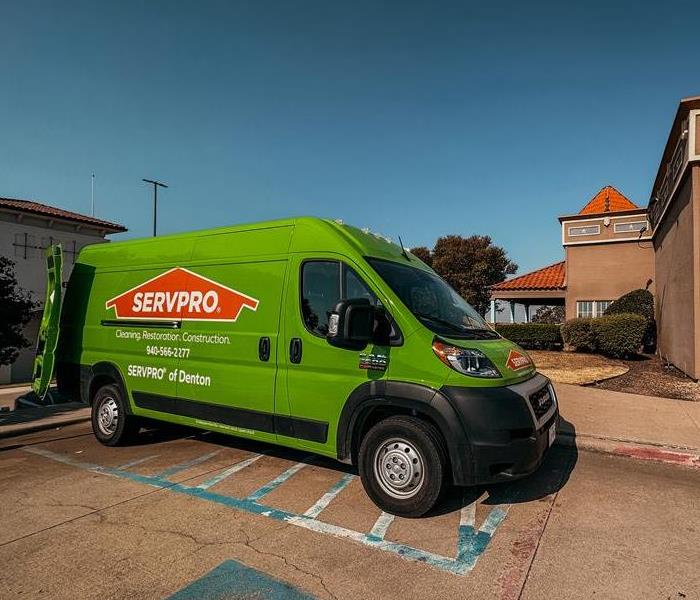 SERVPRO of Denton comes prepared to your facility to fulfill your restoration needs.
SERVPRO of Denton comes prepared to your facility to fulfill your restoration needs.
Understanding what mold is and how it grows
Understanding mold and how it grows is the first step in preventing your business from being affected. Mold is a fungal growth which can be found almost anywhere moisture and oxygen are present. Growth of mold can be harmful to the structure of your building and has the potential to cause health-issues if breathed in. Some common moisture problems that lead to the formation of mold growth are leaks such as from the roof or plumbing, poor drainage around the property and any scenarios of high humidity or condensation.
Knowing where to look for mold can also aid in the preventative maintenance of mold growth. Common places that mold can hide are the backside of drywall, wallpaper, the underside of carpets, paneling, and the top of ceiling tiles. Along with these areas mold can also hide in pipe chases or utility pipes if a leak is present, on walls behind furniture when condensation is present, condensate drain pans inside air handling units, and roof materials above ceiling units. Considering possible spots for mold growth is essential to ensuring your business does not suffer the consequences of this fungal infestation.
There are many suggested prevention strategies along with the knowledge of what mold is and where it grows that are available to you and your business. These strategies include:
- Fixing leaking plumbing/leaks in roofing as soon as they arise
- Prevent moisture by increasing surface temperature such as insulating or increasing air circulation
- Prevent moisture due to condensation by reducing the moisture level in the air by repairing leaks, or increasing air ventilation, or dehumidify
- Perform regular building/HVAC inspections and maintenance
- Dry/clean wet or damp spots within a 48-hour window
- Keep heating, ventilation and air conditioning (HVAC) drip pans clean and unobstructed
- Vent moisture-generating appliances such as dryers, to the outside where possible
- Don’t let foundations stay wet
- Provide drainage and slope the ground away from the foundation
If you suspect that your business might be impacted by mold, please do not hesitate to contact SERVPRO of Denton. We have the qualified experts to meet your needs and ensure your business is restored back to its normal state “Like it never even happened.”
Why Choose SERVPRO
3/8/2024 (Permalink)
 Hardwood floor drying system for water damage.
Hardwood floor drying system for water damage.
Why should you as a homeowner or business owner choose SERVPRO of Denton? Our knowledgeable team is always gearing up to help you with any water or fire damage emergency you may experience in your home or business when you lease expect it. Our team is dedicated to walking you through the process and providing support to you from start to finish with state of the art drying equipment, and fast response we will help make it "Like it never even happened." when you choose SERVPRO of Denton.
When Water Strikes
3/8/2024 (Permalink)
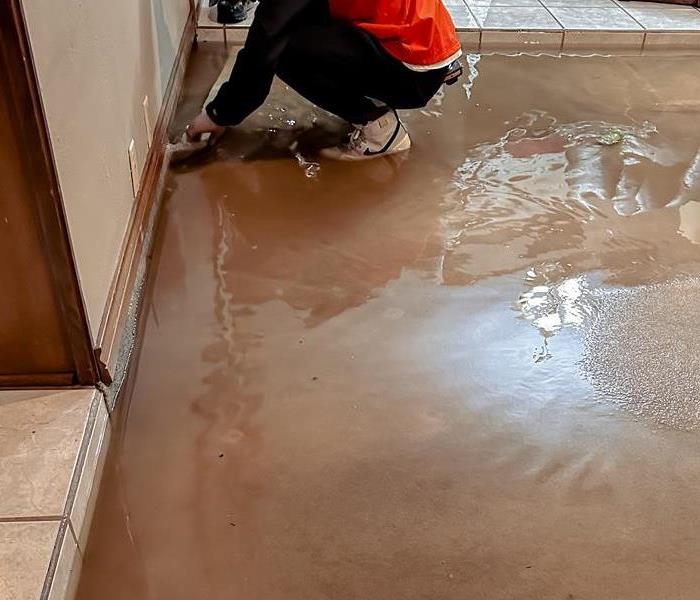 Water heater busted and water accumulated.
Water heater busted and water accumulated.
When a water emergency happens inside your home or business, SERVPRO of Denton can help. Using our specialized equipment and time-tested processes, we can quickly and safely extract water from inside your homes or business no matter the flooring type and then follow that up by providing the needed drying equipment and reconstructing any affected areas. Whether it's from a burst pipe, a broken appliance, or the weather, we've got your back.
Preventing and Managing Freezing Pipe Water Damage in Denton, TX
2/13/2024 (Permalink)
In the heart of Denton, Texas, where the vibrant community thrives among landmarks like the University of North Texas and the historic Courthouse-on-the-Square, the winter season brings not only a break from the usual warmth but also a hidden menace to homes and businesses: freezing pipes. As temperatures drop, the risk of pipes freezing and subsequently bursting becomes a significant concern, leading to potential water damage that can disrupt the comfort and safety of your environment. Understanding how to prevent and manage this issue is essential for Denton residents, and SERVPRO of Denton stands ready to guide you through these chilling challenges.
The Science Behind the Freeze
Water expands as it freezes, a unique property that can cause pipes to burst when water inside them freezes. This issue is particularly prevalent in areas that experience sudden temperature drops, even in regions like Denton, where such cold spells may be infrequent but can still occur. Pipes in attics, crawl spaces, and outside walls are especially vulnerable to freezing due to their exposure to the elements.
Proactive Prevention Measures
Preventing freezing pipes is far more manageable and cost-effective than dealing with the aftermath of a burst pipe. Here are some practical steps you can take to safeguard your home or business:
- Insulate Pipes: Use foam pipe insulation to cover exposed pipes, especially those in unheated areas.
- Seal Leaks: Identify and seal leaks that allow cold air inside near where pipes are located.
- Let Faucets Drip: Allowing a trickle of water to flow through the faucets can prevent pressure buildup from ice blockages.
- Keep Thermostat Consistent: Maintain a consistent temperature during the day and night, and don’t let it drop below 55°F when away.
- Open Cabinet Doors: Allow warmer air to circulate around plumbing by keeping cabinet doors open under sinks.
Responsive Measures for Freezing Events
Should you discover a frozen pipe, it's crucial to act quickly to mitigate potential damage:
- Shut Off Water: If you suspect a pipe has burst, immediately shut off the main water supply.
- Thaw Carefully: If a pipe is frozen but hasn’t burst, you can try to thaw it with a hair dryer, moving the dryer back and forth along the pipe. Never use an open flame.
- Call the Professionals: For significant freezing issues or if a pipe bursts, contacting a professional restoration service like SERVPRO of Denton is imperative.
SERVPRO of Denton: Your Ally in Water Damage Restoration
When prevention measures fall short, and you're faced with water damage from a burst pipe, SERVPRO of Denton is here to help®. Our team of professionals is equipped with advanced water extraction, drying, and restoration technology to address the damage swiftly and efficiently, minimizing the disruption to your life and restoring your property "Like it never even happened."
- 24/7 Emergency Response: We’re ready to respond at any hour, understanding that the quicker we act, the less damage occurs.
- Advanced Techniques: Our team uses state-of-the-art equipment to ensure thorough drying and restoration.
- Local Expertise: Familiar with Denton’s specific needs and challenges, we bring a tailored approach to each situation.
As Denton residents enjoy the unique blend of cultural heritage and modern living that our city offers, it's essential to stay vigilant against the risks posed by freezing temperatures. By taking proactive steps to prevent pipe freezing and knowing how to respond if it occurs, you can protect your property from significant damage. And remember, SERVPRO of Denton is always here to support you with professional water damage restoration services, ensuring your home or business remains a safe and comfortable haven, no matter what the Texas weather throws our way.
Navigating Commercial Water Damage in Denton, Texas for Business Owners
1/30/2024 (Permalink)
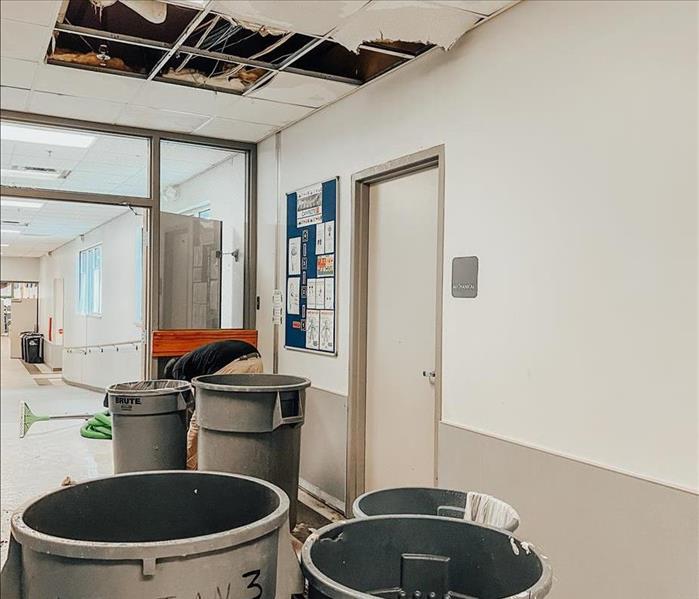 Business Water Damage in Denton, TX
Business Water Damage in Denton, TX
In the bustling city of Denton, Texas, where the vibrant music scene meets the entrepreneurial spirit, businesses face various challenges, including the risk of water damage. Whether it's a quaint café near the University of North Texas or a retail shop in the Golden Triangle Mall area, water damage can strike unexpectedly, causing not just physical damage but also impacting business operations. This guide is dedicated to helping Denton business owners understand and manage commercial water damage effectively.
Understanding Water Damage in Denton’s Commercial Landscape
Common Causes in the Local Context
Denton, with its unique climate and infrastructure, experiences a range of water damage causes. From sudden pipe bursts in older buildings downtown to flooding during Texas thunderstorms, being aware of potential risks is the first step in prevention.
The Impact on Business
Water damage doesn't just affect the physical space; it can disrupt your business operations, leading to loss of revenue and potentially harming your reputation in the community. For a business in a college town like Denton, where word-of-mouth is key, this can be particularly impactful.
Proactive Measures for Prevention and Preparedness
Regular Maintenance and Inspections
- Plumbing and HVAC Systems: Regular checks are crucial. A leak in an establishment near Hickory Street can quickly escalate if not addressed promptly.
- Roof and Gutter Maintenance: Especially before the rainy season, ensure that roofs and gutters are well-maintained to prevent leaks.
Emergency Planning
- Develop a Response Plan: Have a clear plan that includes shutting off utilities, protecting vital records, and an evacuation strategy.
- Employee Training: Ensure that all employees are aware of the emergency plan. Quick action can often mitigate damage significantly.
When Water Damage Occurs: Immediate Response Steps
- Safety First: Ensure the safety of employees and customers. Address electrical hazards and avoid using damaged electronic equipment.
- Stop the Source: If possible, identify and stop the source of the water to prevent further damage.
- Document the Damage: Take pictures and detailed notes. This will be crucial for insurance claims.
- Contact Professionals: Reach out to water damage restoration experts like SERVPRO for immediate assistance.
SERVPRO: Denton’s Partner in Water Damage Restoration
Why is SERVPRO the go-to for Denton businesses facing water damage? Here’s why:
- Local Presence, National Expertise: With a deep understanding of Denton's specific needs and access to national resources, SERVPRO offers the best of both worlds.
- 24/7 Emergency Services: Because water damage doesn't stick to business hours, our team is available around the clock.
- Advanced Restoration Techniques: We employ the latest technology and methods for water extraction, drying, and restoration.
Additional Services for Comprehensive Recovery
- Mold Remediation: In a humid Texas climate, addressing mold growth post-water damage is crucial for maintaining a healthy environment.
- Document and Equipment Restoration: We understand that your business's assets go beyond just the physical space.
Conclusion: Staying Ahead of Water Damage in Denton
For Denton businesses, being prepared for water damage is not just about protecting property, but also about ensuring continuity and resilience in the face of adversity. By understanding risks, implementing preventive measures, and knowing how to respond effectively, you can safeguard your business against the unexpected.
Remember, in the event of water damage, SERVPRO of Denton is here to help restore your business space to its pre-damage glory, allowing you to focus on what you do best – running your business and serving the Denton community.
The Restoration Process with SERVPRO of Denton
7/11/2023 (Permalink)
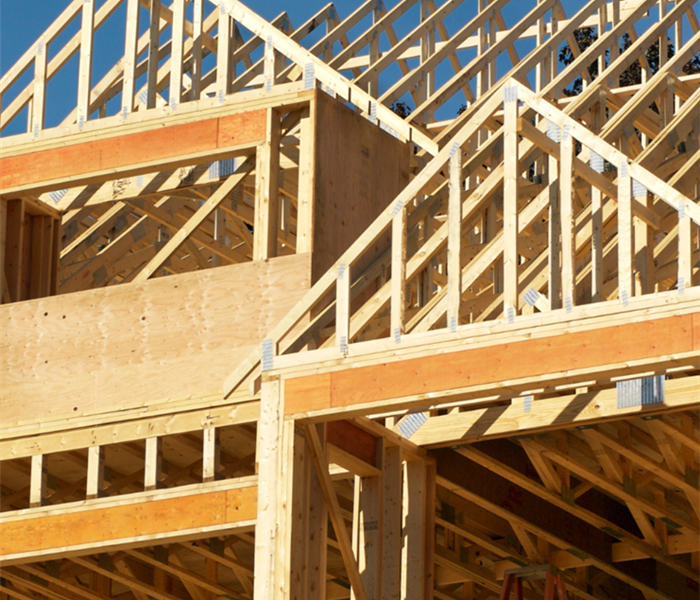 Building Restoration
Building Restoration
Disasters, whether natural or man-made, can cause significant damage to your property. However, the aftermath doesn't have to be a time of confusion and distress. Here at SERVPRO of Denton, we pride ourselves on providing a comprehensive and efficient restoration process to bring your property back to its pre-damage condition.
Our restoration process begins with a detailed damage assessment. This allows us to determine the extent of the damage and develop an effective plan of action. Whether it's fire, water, or storm damage, this initial assessment is crucial for outlining the necessary steps for restoration.
If water damage is involved, we move to water extraction and drying. Using state-of-the-art equipment, we effectively remove standing water and begin the drying process to prevent further damage and potential mold growth. This phase also includes the sanitization of affected areas to ensure a clean, safe environment.
Next, we proceed to the cleaning and repair phase. Here, any signs of damage are eliminated, and necessary repairs are carried out. This could involve replacing drywall, fixing structural elements, or cleaning and deodorizing the area.
The final phase is restoration, where we return the property to its pre-damage state. This can include minor repairs like painting and carpet replacement, or it can involve major reconstruction efforts.
By engaging professionals like SERVPRO of Denton, you're ensuring a thorough, efficient, and effective restoration process. We're committed to minimizing further damage and cost, giving you peace of mind as you navigate this challenging time.
Reclaim Your Space, Your Peace with SERVPRO® of Denton
7/5/2023 (Permalink)
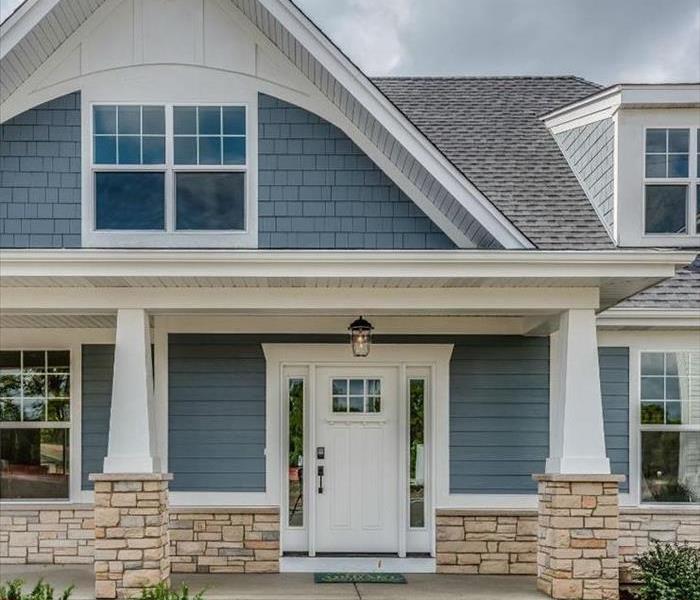 Restoring your home to its former glory, SERVPRO® of Denton is your 24/7 beacon of hope. We're committed to helping you reclaim not just your property
Restoring your home to its former glory, SERVPRO® of Denton is your 24/7 beacon of hope. We're committed to helping you reclaim not just your property
Your home is your sanctuary, a personal retreat providing peace and security. When disaster strikes, however, it can disrupt that tranquility. SERVPRO® of Denton is committed to helping restore not just your property, but also your peace of mind.
Fire, water, mold—each poses unique challenges. SERVPRO® of Denton, with its 24/7 availability, is always ready to provide efficient, high-quality restoration services for these disasters.
Water damage, whether from flooding or a broken pipe, can wreak havoc on your home. We offer water removal, dehumidification, and drying services to restore your property to pre-damage condition. Our team also performs necessary structural repairs, mitigating water's lasting effects.
Fire, a particularly destructive force, can cause extensive damage. SERVPRO® of Denton's fire damage restoration services include soot, smoke, and odor removal, along with structural cleaning and restoration, ensuring your home is safe and comfortable once more.
Mold is a silent intruder, often going unnoticed until it becomes a significant problem. Our mold remediation services include identifying the source of the mold, containing its spread, removing mold-infested materials, and cleaning the area to prevent future growth.
Beyond these, we provide storm damage cleanup, biohazard cleanup, and carpet & upholstery cleaning, among other cleaning services, to ensure your home is in its best state.
Restoration isn't merely about fixing a problem. It's about rebuilding your life and reclaiming your peace. SERVPRO® of Denton doesn’t just restore homes; we restore peace of mind. Our experts are on standby, ready to provide you the services you need, any time of the day or night.
Trust SERVPRO® of Denton to restore your home and serenity. Because, when it comes to restoring peace, every second counts.
Weathering the Storm: Your Guide to Post-Storm Recovery by SERVPRO of Denton
7/2/2023 (Permalink)
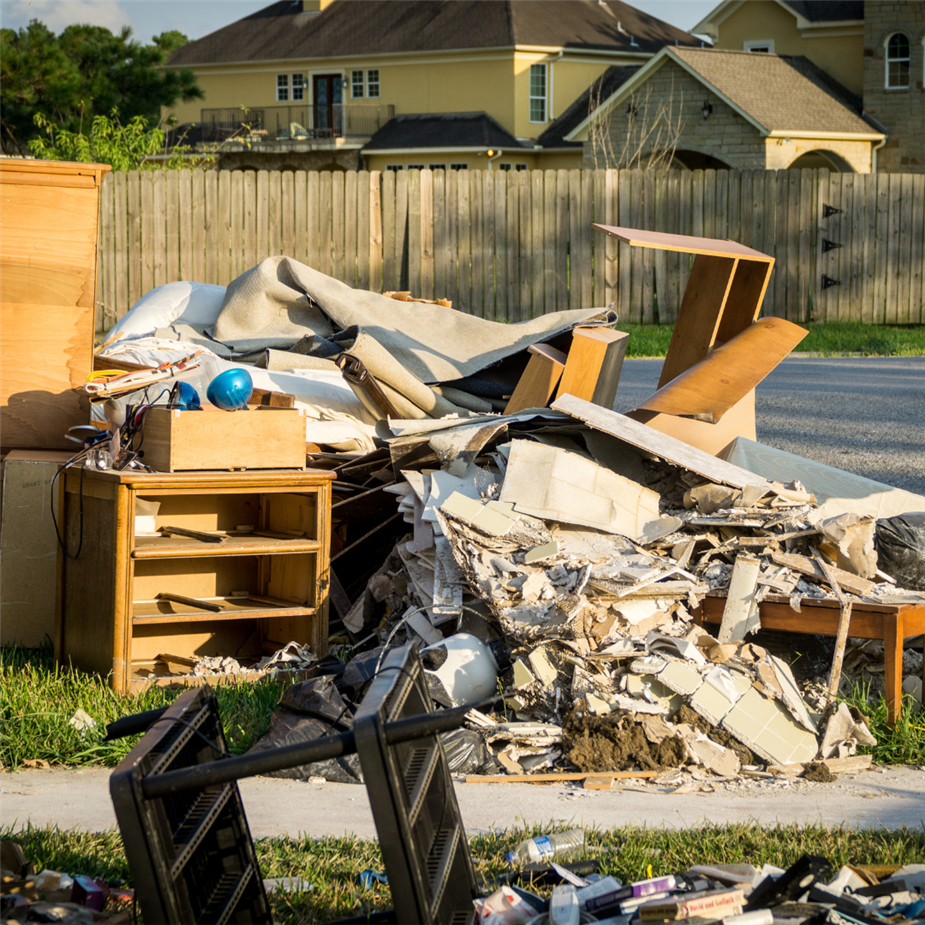 After the Storm
After the Storm
Storms can arrive with little warning and leave a trail of destruction in their wake. At SERVPRO® of Denton, we're here to guide you through the storm aftermath with understanding and expertise.
- Understanding the Risks: Storm damage can span various categories from water infiltration and structural damage to fallen trees and power failures. It's essential to understand these threats to take effective recovery actions.
- Immediate Actions: Safety is paramount. Avoid entering a storm-damaged property until professionals have deemed it safe. Keep clear of downed power lines, and document the damage for insurance purposes.
- Expert Recovery: Recovering from storm damage requires expert assistance. Professional teams can assess the damage, perform emergency repairs, and execute a comprehensive restoration plan.
SERVPRO® of Denton: Your Storm Damage Recovery Ally.
- 24/7 Emergency Response: Time is of the essence after a storm. Our team is ready to respond immediately, reducing further damage and recovery costs.
- Damage Assessment: We thoroughly inspect the property, documenting the extent and type of damage for insurance claims and recovery planning.
- Water Extraction and Drying: We quickly remove excess water, then use advanced drying techniques to minimize water damage and potential mold growth.
- Restoration: We restore your property to its pre-storm condition, handling everything from minor repairs to major reconstruction.
At SERVPRO® of Denton, we're more than a restoration company. We're your neighbors, your partners in navigating storm aftermaths, and your supporters in the journey back to normalcy.
No matter the storm, remember that SERVPRO® of Denton stands ready to turn 'After the disaster' into 'Like it even happened™'.
 SERVPRO of Denton offers document restoration for all types of documents such as books, certificates, photographs, contracts, and much more.
SERVPRO of Denton offers document restoration for all types of documents such as books, certificates, photographs, contracts, and much more.





 24/7 Emergency Service
24/7 Emergency Service


